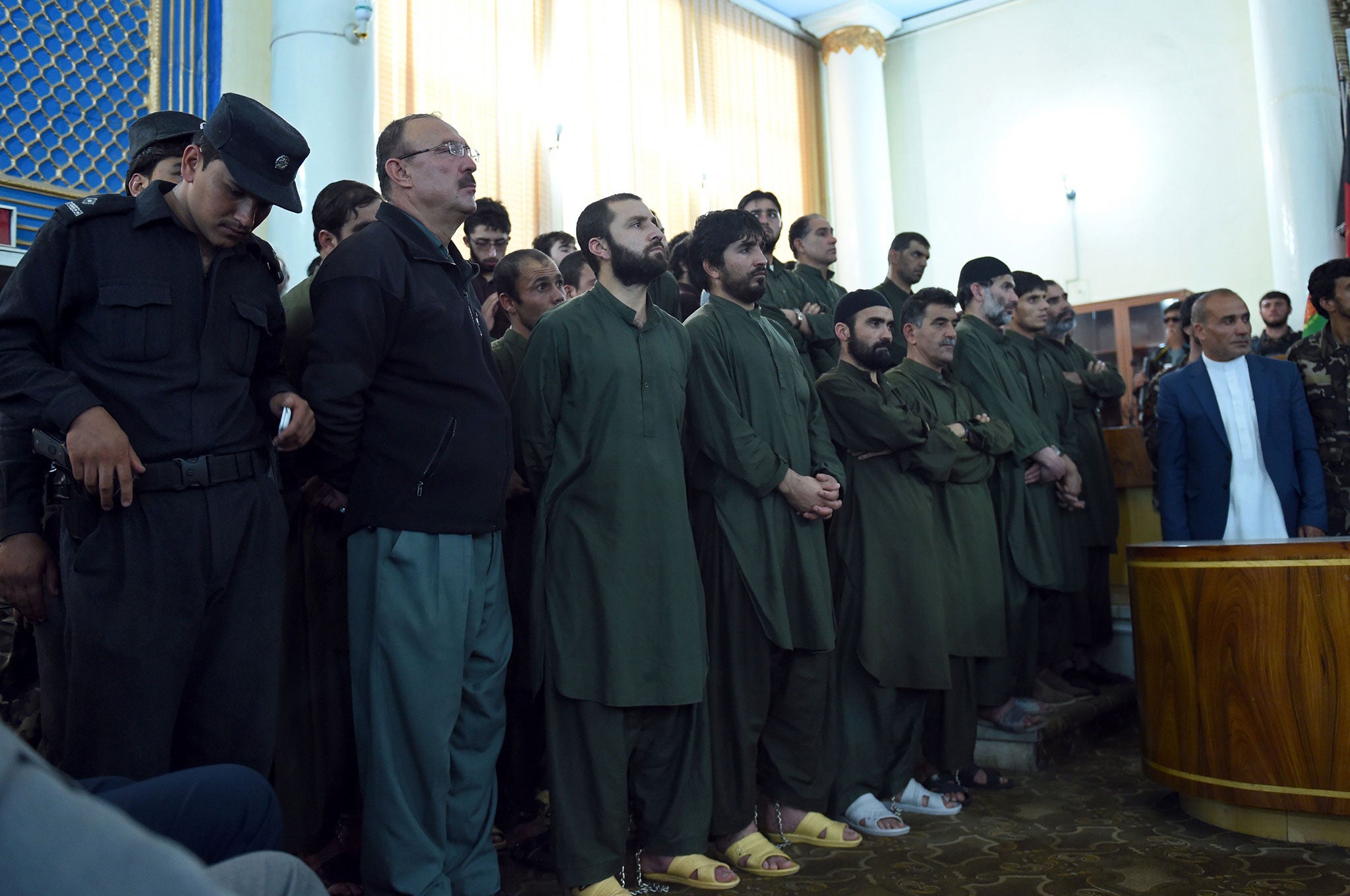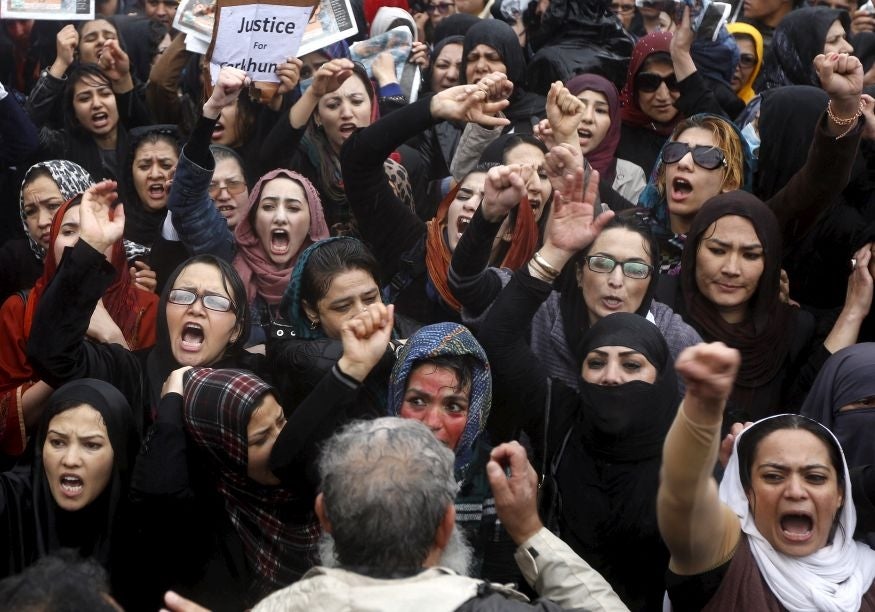Four men sentenced to death in Kabul over mob killing of Afghan woman accused of burning Koran
The woman's death sparked mass protests in Kabul after witnesses claimed she had been falsely accused

Your support helps us to tell the story
From reproductive rights to climate change to Big Tech, The Independent is on the ground when the story is developing. Whether it's investigating the financials of Elon Musk's pro-Trump PAC or producing our latest documentary, 'The A Word', which shines a light on the American women fighting for reproductive rights, we know how important it is to parse out the facts from the messaging.
At such a critical moment in US history, we need reporters on the ground. Your donation allows us to keep sending journalists to speak to both sides of the story.
The Independent is trusted by Americans across the entire political spectrum. And unlike many other quality news outlets, we choose not to lock Americans out of our reporting and analysis with paywalls. We believe quality journalism should be available to everyone, paid for by those who can afford it.
Your support makes all the difference.Haji Essa remembers the moment Farkhunda was beaten to death less than a mile from the presidential palace in Kabul. “It felt like I was living in a jungle, not in a city. Everyone watched. I even blame myself for not doing anything,” the 40-year-old, who was some 300 yards away at the time, said.
It was broad daylight when Farkhunda was killed. Many watched, like Essa, and dozens were involved in the assault. The police were culpable too. Now, a court in the Afghan capital Kabul has handed down death sentences to four men for taking part in the attack when the 28-year-old woman was beaten to death after being falsely accused of burning the Koran. Many more were involved, but remain free.
The verdict followed nationwide protests against the treatment of women in Afghanistan and was reached after a hasty four-day trial, broadcast live on Afghan television.
Eight other men were sentenced to 16 years in prison, while the court acquitted 18, citing a “lack of evidence”. The court is yet to rule on charges against 19 policemen, who have been accused of failing in their duty to prevent the attack. A verdict against the policemen is expected on Sunday.
Farkhunda, a religious scholar, was attacked by the mob when she was arguing with a religious teacher over his practice of selling “charms”. She was beaten to death and her body was driven over by a vehicle before being burnt.

Those sentenced to death include a peddler who made the Koran-burning accusation; a man who threw two large rocks at her; the driver of the car that ran over her and the man who set her body alight. Campaigners in Afghanistan have expressed their anguish over the verdict given to 18 of the accused, while some have even called the trial a “messy” and “rushed” effort to bring the case to trial.
Fawzia Koofi, an MP from the north-eastern province of Badakhshan, told The Independent she would attempt to appeal against the court’s decision to free 18 of the accused. “These 18 men shouldn’t have been freed,” she said. “It is possible that some of them didn’t attack Farkhunda but that doesn’t absolve them. They played a role. They also failed to play their role of responsible citizens by not calling the police.”
Ms Koofi also accused the police of trying to subvert justice. “The police failed as an institution. We will not rest until justice is done.”
Heather Barr, senior researcher for womens’ rights in Asia at Human Rights Watch, said the case called for exceptional care by the Afghan government to ensure a fair trial and careful assignment of accountability. “Instead, this trial feels like a messy and rushed effort to wrap things up and move on. The outcome is both too harsh and too lenient,” she said.
“There are real concerns about the due process in this particular trial. The defendants did not appear to have meaningful representation by defence attorneys, and hearing a case in four days on such serious charges seems inherently rushed and likely insufficient to satisfy the defendants’ right to a fair trial,” Ms Barr added.
“Another troubling issue is that the Afghan government shows no signs of being willing to tackle the broader implications of Farkhunda’s murder – the tolerance of and impunity for violence against women which is endemic in Afghanistan. This case should have been a wakeup call and an opening for President Ghani to take new steps to fully enforce the Law on the Elimination of Violence Against Women – and he seems to have completely ignored that imperative.”
Afghanistan’s judicial system has long faced criticism over its inability to provide the majority of Afghans access to justice. Women are sidelined, despite constitutional guarantees of equality and protection from violence, the UN recently concluded.
Wazhma Frogh, founder and president of the Kabul-based Research Institute for Women, Peace and Security, said that had Farkhunda been a man, she would have never been killed. “We have cases in which men have been accused of blasphemy and they were given asylum into other countries,” she said.
Farkhunda’s brother, Mujibullah, told the Associated Press that the family was angered by the leniency of the court toward the majority of the defendants. “The outcome of the trial is not fair and we do not accept it – you saw just four people sentenced to death but everybody knows that more than 40 people were involved in martyring and burning and beating my sister,” said Mujibullah. “Eighteen people have been freed. The court should punish them and that should be a lesson for anyone who would commit this sort of crime, anywhere in our country, in the future.”
Ms Frogh added: “Farkhunda’s lynching was not an ordinary mob crime. It was a last hammer on the heads of Afghan women that they can’t raise their voices against anything or anyone in this country.”
Farkhunda’s parents addressed the court before the sentences were handed down, asking for the accused be dealt with according to the law. “Everybody saw what happened and I insist on justice,” her mother, Bibi Hajira, told the court. “That’s all I want.”
Join our commenting forum
Join thought-provoking conversations, follow other Independent readers and see their replies
Comments